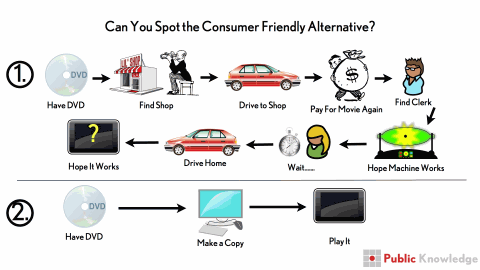Public interest group Public Knowledge says movie studios like Warner Bros. are blinding themselves to reality, by offering a legal "alternative" to DVD ripping that includes 7 steps, including a drive to and from a retail store.
Public Knowledge is petitioning the US Copyright Office to make DVD ripping legal, to keep up with the consumer's changing needs in the digital world. The groups say that with many video playback devices now no longer supporting a disc drive, devices such as Apple's iPad, there's an increasing need for people to be able to "convert" their own DVD collection to a compatible digital format. Currently, DVD ripping is considered illegal under the DMCA (Digital Millennium Copyright Act).
But movie studios say there are already legal alternatives to DVD ripping, and in their response to PK's petition, and they made reference to Warner Bros' "Disc to Digital" program. But according to PK, this very program is the reason why DVD ripping should be granted an exemption from current copyright laws.
The "Disc to Digital" requires DVD owners to drive to their nearest retail store that's taking part in the program, hand their disc to a store clerk, who will then run the disc through a special machine that will produce a DRM protected digital copy of the film. And despite the trouble movie lovers will have to go through, Warner is planning to charge users for every conversion made.
In comparison, PK says, the current illegal alternative simply requires using one of the many available free DVD rippers/converters, a process that could be done and dusted with a few clicks of the mouse, without ever having the need to leave home, or pay to get a copy of a movie you've already paid for.
PK has even produced a graphics showing how convoluted Warner's plans may be, compared to something many people are already doing on a regular basis (and breaking the law while doing it):

Studios say that piracy concerns means they have to lock down their formats, although DRM has not stopped movies being illegally uploaded and downloaded online. But PK says studios are less interested in piracy protection, and more interested in charging consumers time and time again for the same content. "Why let customers make legitimate personal copies of movies they own at home when you could charge them to do it at a store?" asks PK's Michael Weinberg on the group's blog.
Public Knowledge is petitioning the US Copyright Office to make DVD ripping legal, to keep up with the consumer's changing needs in the digital world. The groups say that with many video playback devices now no longer supporting a disc drive, devices such as Apple's iPad, there's an increasing need for people to be able to "convert" their own DVD collection to a compatible digital format. Currently, DVD ripping is considered illegal under the DMCA (Digital Millennium Copyright Act).
But movie studios say there are already legal alternatives to DVD ripping, and in their response to PK's petition, and they made reference to Warner Bros' "Disc to Digital" program. But according to PK, this very program is the reason why DVD ripping should be granted an exemption from current copyright laws.
The "Disc to Digital" requires DVD owners to drive to their nearest retail store that's taking part in the program, hand their disc to a store clerk, who will then run the disc through a special machine that will produce a DRM protected digital copy of the film. And despite the trouble movie lovers will have to go through, Warner is planning to charge users for every conversion made.
In comparison, PK says, the current illegal alternative simply requires using one of the many available free DVD rippers/converters, a process that could be done and dusted with a few clicks of the mouse, without ever having the need to leave home, or pay to get a copy of a movie you've already paid for.
PK has even produced a graphics showing how convoluted Warner's plans may be, compared to something many people are already doing on a regular basis (and breaking the law while doing it):

Studios say that piracy concerns means they have to lock down their formats, although DRM has not stopped movies being illegally uploaded and downloaded online. But PK says studios are less interested in piracy protection, and more interested in charging consumers time and time again for the same content. "Why let customers make legitimate personal copies of movies they own at home when you could charge them to do it at a store?" asks PK's Michael Weinberg on the group's blog.


Comment